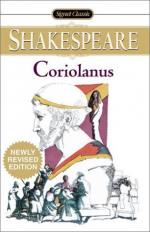|
This section contains 7,956 words (approx. 27 pages at 300 words per page) |

|
William M. Hawley
A skilled practitioner of martial law, Coriolanus ultimately favors the emancipation of peace over war. Convicted of treason in disparate jurisdictions, though, he dies for having twice outlived his usefulness as a warrior. He remains unreflective about death and never questions or alters the hypotheticals leading to his destruction, unlike Hamlet or Macbeth. His hatred of theatrical shows only makes his performance all the more arresting. Because Rome and Antium mete out excessive punishments against him for imperfectly conceived reasons of social hygiene, social cohesion is maintained in two civil arenas without its raison d'être of achieving permanent reform or emancipation.
The play's Roman quality appears in Coriolanus's embrace of reform through martial law as against tribunal power, not in its imitation of Roman tragedy as such. Deuteronomy provides very broad outlines for the conduct of war, but the Romans codified their own detailed...
|
This section contains 7,956 words (approx. 27 pages at 300 words per page) |

|


